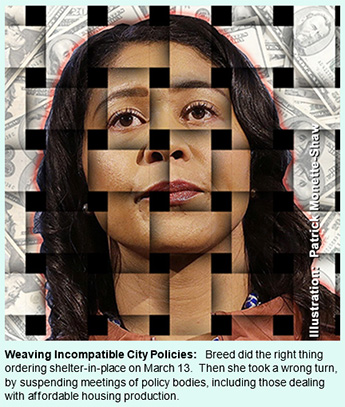 April 2020
April 2020COVID-19’s Impact on Affordable Housing Production
Public Records “Essential” In a Pandemic
Printer-friendly PDF file
 April 2020
April 2020
COVID-19’s Impact on Affordable Housing Production
Public Records “Essential” In a Pandemic
by Patrick Monette-Shaw
Mayor London Breed is to be congratulated for issuing her shelter-in-place (SIP) Order on March 13 hoping to contain spread of the COVID-19 virus and flatten the curve from the global pandemic, and its impact on San Franciscans. She did so before Governor Gavin Newsom issued a statewide SIP three days later.
Hopefully, now that wider COVID-19 testing is belatedly beginning to occur in our City, her relatively early actions may sustain flattening of the curve.
But curiously Breed’s SIP Order on March 13 raised some questions. That Order followed Breed’s declaration of a local emergency announcement on February 25. One question is why it took 17 days following the declaration of emergency before she issued her SIP order on March 13, particularly since she had issued an order closing Laguna Honda Hospital to visitors a week earlier on March 6.
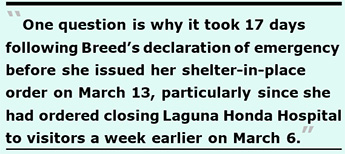 Declaring a state of emergency is a procedural measure allowing a county to leverage state funds and mutual aid resources if cases of the virus are confirmed locally. The declaration of an emergency allowed San Francisco officials to secure emergency state and federal funding, and other resources and personnel, to accelerate emergency planning and expand capabilities for a rapid response.
Declaring a state of emergency is a procedural measure allowing a county to leverage state funds and mutual aid resources if cases of the virus are confirmed locally. The declaration of an emergency allowed San Francisco officials to secure emergency state and federal funding, and other resources and personnel, to accelerate emergency planning and expand capabilities for a rapid response.
To date, Breed has issued 10 supplemental amendments to her Emergency Declaration issued on February 25.
Another question involves Santa Clara County, which issued its local emergency declaration on February 3 when its first two COVID-19 cases caused by international travel were initially reported. Why did it take Breed 22 days after Santa Clara had issued its emergency declaration before she issued San Francisco’s emergency declaration order? As our South Bay neighbor, weren’t the two counties coordinating on a regional basis with all nine Bay Area counties to simultaneously announce and implement uniform emergency declarations regionally?
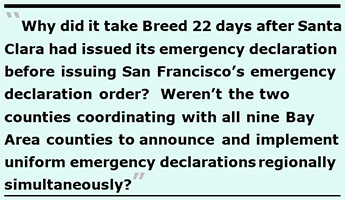 Breed Clamps Down on Open Government
Breed Clamps Down on Open Government
Breed’s antipathy to our local Sunshine Ordinance is well known, and dates back years to when she was president of the Board of Supervisors. On April 4, 2018 the Sunshine Ordinance Task Force ruled 7-to-0 that Breed had failed six times between 2015 and 2017 to respond to public records requests, and had failed to appear or send a representative on her behalf to 10 Sunshine Task Force hearings to explain why she had ignored responding to the records’ requests. The Task Force referred her failures to then District Attorney George Gascón for enforcement. (Predictably, Gascón took no action so Breed skated.) In addition, back in 2015 Breed initially voted as the lone dissenter on a Board of Supervisors vote on legislation requiring all City supervisors to publicly disclose their appointment calendars.
During an emergency, or a national public health crisis, journalists and citizens know trade-offs need to be made, including restricting inspection of records at 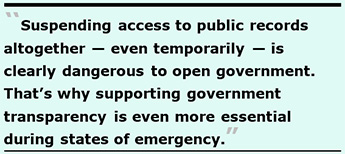 City Hall and offices of other City agencies, and delays responding to records requests because of understaffing of government agencies. But suspending access to public records altogether — even temporarily — is clearly dangerous to open government. That’s why supporting government transparency is even more essential during states of emergency, to prevent long-term damage to our open government once the COVID-19 crisis eventually passes. (Unfortunately, it may be with us for a long, long time.)
City Hall and offices of other City agencies, and delays responding to records requests because of understaffing of government agencies. But suspending access to public records altogether — even temporarily — is clearly dangerous to open government. That’s why supporting government transparency is even more essential during states of emergency, to prevent long-term damage to our open government once the COVID-19 crisis eventually passes. (Unfortunately, it may be with us for a long, long time.)
Breed essentially has no patience for public records requests, following in the footsteps of her mentor, Willie Brown. Her record while on the Board reflects that she did not support open government.
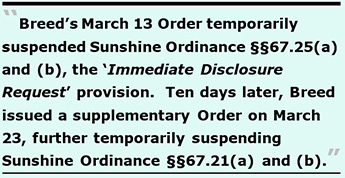 Part of Breed’s March 13 Order temporarily suspended San Francisco Sunshine Ordinance §§67.25(a) and (b), the “Immediate Disclosure Request” provision in Sunshine that strengthened the California Public Records Act (CPRA) to provide for expedited release of public records. Ten days later, Breed issued a supplementary Order on March 23, further temporarily suspending Sunshine Ordinance §§67.21(a) and (b), which provide that members of the public can inspect or examine records in person at City offices open to the public, provided they comply with CPRA.
Part of Breed’s March 13 Order temporarily suspended San Francisco Sunshine Ordinance §§67.25(a) and (b), the “Immediate Disclosure Request” provision in Sunshine that strengthened the California Public Records Act (CPRA) to provide for expedited release of public records. Ten days later, Breed issued a supplementary Order on March 23, further temporarily suspending Sunshine Ordinance §§67.21(a) and (b), which provide that members of the public can inspect or examine records in person at City offices open to the public, provided they comply with CPRA.
Breed’s 10 supplementary amendments through April 14 to her February 25 Declaration of a Local Emergency have successively stripped away many other significant portions of the Sunshine Ordinance. And various of the supplementary amendments to her Declaration of a Local Emergency clamped down on City policy and advisory bodies from holding any public meetings, and ordered City agencies to cease nonessential operations and nonessential City business.
While it may be totally understandable that many City offices are closed during the COVID-19 pandemic because employees may be furloughed, are working and telecommuting from home, or assigned other duties as disaster service workers, suspension of portions of the Sunshine Ordinance is a matter of public concern. It’s also completely understandable that city agencies may have fewer resources to dedicate to public records requests, some city employees may be unfamiliar with particular records or may be physically separated from the records, and appropriate redactions may be harder to make due to employees working remotely.
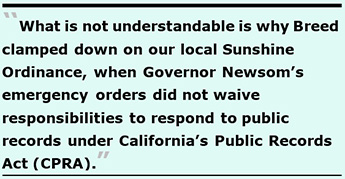 What is not understandable is why Breed clamped down on our local Sunshine Ordinance, when Governor Newsom’s emergency orders did not waive responsibilities to respond to public records under CPRA. Breed shouldn’t have done so with San Francisco’s Sunshine Ordinance.
What is not understandable is why Breed clamped down on our local Sunshine Ordinance, when Governor Newsom’s emergency orders did not waive responsibilities to respond to public records under CPRA. Breed shouldn’t have done so with San Francisco’s Sunshine Ordinance.
The City Attorney’s Office noted on March 30 that City agencies still have a legal duty to provide public records promptly, have a legal duty to advise records requestors of the date on which an agency expects to actually produce requested records, and a duty to provide the records on a rolling basis. The City Attorney noted City agencies should make reasonable efforts to provide records to the extent feasible, and cannot adopt a blanket policy unnecessarily delaying or denying records requests carte blanche during Breed’s suspension of Sunshine.
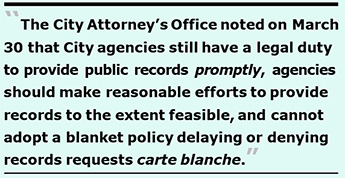 The City Attorney’s “opinion” (which is an opinion, not a matter of settled law) gives the green light for City agencies to delay even starting to search for a given public record for a period of time, perhaps including not having to start a search for public records until after Breed’s temporary shelter-in-place order is lifted on May 3. But what happens if she extends her Order into June or July? Will that add even further delays in starting records searches?
The City Attorney’s “opinion” (which is an opinion, not a matter of settled law) gives the green light for City agencies to delay even starting to search for a given public record for a period of time, perhaps including not having to start a search for public records until after Breed’s temporary shelter-in-place order is lifted on May 3. But what happens if she extends her Order into June or July? Will that add even further delays in starting records searches?
Of grave concern, in response to a public records request about progress on the RFQ to select a developer for a senior housing project on the campus of Laguna Honda Hospital, the Mayor’s Office of Housing and Community Development (MOHCD) issued its “Emergency Policy on Sunshine [records requests]” on April 3, stating that it “may even be[come] necessary for MOHCD to delay the start of a search for records until [Breed’s] stay-at-home Order is lifted [in May].”
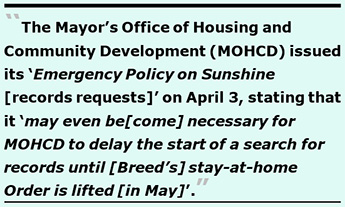 To a whistleblower, citizen watchdog, and columnist like me, that sounds like a dog whistle that MOHCD may end up implementing a blanket policy unnecessarily delaying or denying records requests carte blanche for any affordable housing projects currently being developed, in the pipeline, or under consideration.
To a whistleblower, citizen watchdog, and columnist like me, that sounds like a dog whistle that MOHCD may end up implementing a blanket policy unnecessarily delaying or denying records requests carte blanche for any affordable housing projects currently being developed, in the pipeline, or under consideration.
After all, MOHCD is in the process of administering $1.2 billion in Affordable Housing Bond-funded projects (including the $310 million affordable housing bond passed in 2015, the $600 million affordable housing bond passed in 2019, plus the remaining $261 million from the PASS bond that was re-allocated to fund affordable housing).
Public records involving MOHCD’s stewardship of the affordable housing bonds should not be subject to having to wait for Breed’s stay-at-home order to be lifted before records searches even begin. How many other City departments have implemented, or are considering implementing, blanket policies to delay the start of searches for public records until Breed’s SIP Order is eventually lifted?
Advocacy Groups Support Transparency During COVID-19 Crisis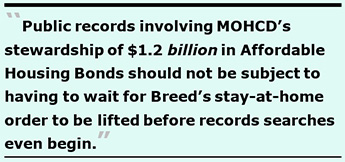 Obviously, openness in government is essential to the functioning of any democracy. California’s State Constitution stipulates in Article 1, Section 3(b)(1) “The people have the right of access to information concerning the conduct of the people’s business, and, therefore, the meetings of public bodies and the writings of public officials and agencies shall be open to public scrutiny.”
Obviously, openness in government is essential to the functioning of any democracy. California’s State Constitution stipulates in Article 1, Section 3(b)(1) “The people have the right of access to information concerning the conduct of the people’s business, and, therefore, the meetings of public bodies and the writings of public officials and agencies shall be open to public scrutiny.”
On March 20, over 130 organizations — including the California First Amendment Coalition, the Society of Professional Journalists, and the Electronic Frontier Foundation — signed a letter calling for custodians of public records at all levels of government to leverage technology resources to make governance more inclusive, more credible and more accessible, and not to suspend compliance with public records laws providing transparency and accountability. Another article notes that legitimacy of government decision-making requires a renewed commitment to transparency during emergencies, particularly public health emergencies, now more than ever.
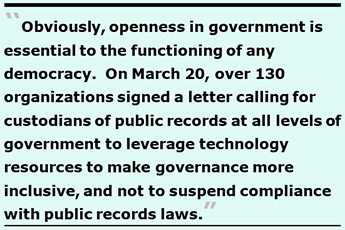 Surely in the heart of Silicon Valley, we currently have the technology to make transparency happen.
Surely in the heart of Silicon Valley, we currently have the technology to make transparency happen.
After all, the City’s current state-of-the-art technology enables staff working from home to remotely access all of their e-mail records, and other computer files on departmental network drives, so long as their respective City departments have made the features available with network permissions. While I’m not a lawyer or a technology expert, I know from past employment with the City that costs to provide remote network access are either non-existent because they’re included in the City’s Microsoft Outlook basic configuration contract, or minimal additional cost for such things as VPN access or network “authentication” permissions, given that the City has a $12 billion annual budget.
For mission-essential City employees, the technology is already largely in place to increase government transparency. That technology needs to be expanded to all boards and commissions, and bond oversight committees, not just to City employees.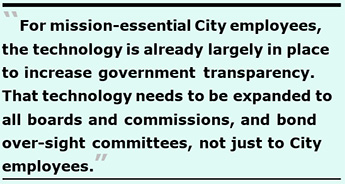
Essential City Boards and Commissions
Unfortunately, too many policy bodies that provide essential functions have suspended their meetings indefinitely, including agencies involved in affordable housing production. It’s time for Breed to re-visit which City boards, commissions, and policy bodies are essential and should fully resume their operations using remote meeting access.
Breed’s various Orders have restricted construction of commercial buildings, but allow affordable housing construction to continue as an “essential” service.
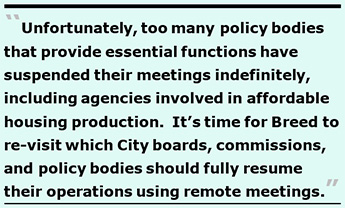 However, the Citizens’ General Obligation Bond Oversight Committee (CGOBOC) has been affected by Breed’s Orders. CGOBOC not only is monitoring oversight of the $1.2 billion in affordable housing bonds, it also provides oversight of public health and safety bonds, parks bonds, Earthquake Safety and Emergency Response (ESER) bonds, Road Repaving and Street Safety (RRSS) bonds, other transportation and road improvement bonds, and other bonds.
However, the Citizens’ General Obligation Bond Oversight Committee (CGOBOC) has been affected by Breed’s Orders. CGOBOC not only is monitoring oversight of the $1.2 billion in affordable housing bonds, it also provides oversight of public health and safety bonds, parks bonds, Earthquake Safety and Emergency Response (ESER) bonds, Road Repaving and Street Safety (RRSS) bonds, other transportation and road improvement bonds, and other bonds.
Each bond program will have all issuances in the same appearance on the CGOBOC agenda, e.g., all Parks bonds regardless of year issue are all heard together during a single CGOBC meeting, and all three Affordable Housing Bonds are presented during a single meeting.
CGOBOC currently meets only five times per year, with meetings typically restricted to two or three hours each. Formal reports and presentations on the status of each Bond are made only once annually. Each bond is updated verbally by the CGOBOC member assigned as a liaison to various City departments at the CGOBOC meeting nearest to six months from their formal presentation date.
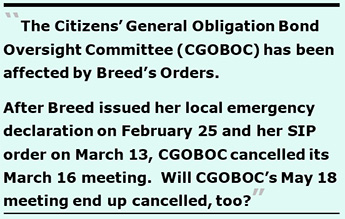 CGOBOC’s January 2020 meeting crammed in including reports about multiple Parks bonds, the ESER bond, a liaison report on the public safety bonds, and the three Affordable Housing Bonds. Strangely, next to nothing was presented in January reporting on the $600 million Affordable Housing bond passed in November 2019.
CGOBOC’s January 2020 meeting crammed in including reports about multiple Parks bonds, the ESER bond, a liaison report on the public safety bonds, and the three Affordable Housing Bonds. Strangely, next to nothing was presented in January reporting on the $600 million Affordable Housing bond passed in November 2019.
Then, after Breed had issued her local emergency declaration on February 25 and her SIP order on March 13, CGOBOC cancelled its March 16 meeting, which was to have heard formal presentations on the RRSS bonds and transportation bonds, and the six-month liaison report on the Parks bonds.
CGOBOC’s next meeting is scheduled for May 18 to hear liaison reports on the ESER and Affordable Housing bonds — provided it isn’t cancelled, too. But at this point, it’s doubtful that City boards and agencies like CGOBOC will resume their public meetings just 15 days after the SIP order is scheduled to be lifted on May 3, and for all we know now Breed may choose to extend the SIP again. Anthony Fauci believes SIP orders should remain in place at least through the end of May, not May 3.
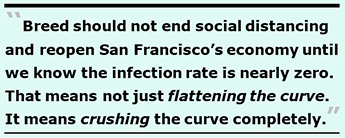 Breed should not end social distancing and reopen San Francisco’s economy until we know the infection rate is nearly zero. That means not just flattening the curve. It means crushing the curve completely. That’s not going to happen within 15 days from May 3. That suggests she needs to turn to rapidly expanding remote meeting access for policy bodies like CGOBOC and MOHCD.
Breed should not end social distancing and reopen San Francisco’s economy until we know the infection rate is nearly zero. That means not just flattening the curve. It means crushing the curve completely. That’s not going to happen within 15 days from May 3. That suggests she needs to turn to rapidly expanding remote meeting access for policy bodies like CGOBOC and MOHCD.
Breed needs to make sure CGOBOC’s meetings continue to be held — remotely, if necessary — and ensure each CGOBOC member and relevant City departments are able to hold meetings remotely by beefing up their state-of-the-art technology and access to conduct meetings remotely. Their meetings — involving essential bond-funded infrastructure and housing construction — should not continue being cancelled until we have a vaccine against COVID-19, 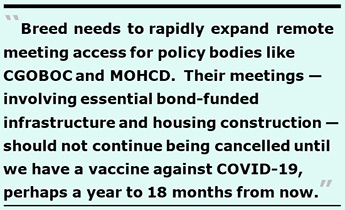 perhaps a year to 18 months from now. If the Board of Supervisors is using technology successfully to hold remote meetings, then all policy bodies dealing with essential City business should be equipped for remote meetings, too.
perhaps a year to 18 months from now. If the Board of Supervisors is using technology successfully to hold remote meetings, then all policy bodies dealing with essential City business should be equipped for remote meetings, too.
After all, on March 17, 2020 the Board of Supervisors authorized their full Board and Sub-Committee meetings to convene remotely and allow for remote public comment, pursuant to restrictions on videoconferencing and teleconferencing that have now been lifted. All City policy bodies and City Departments should immediately implement videoconferencing and teleconferencing.
Stalled LHH Housing Project
Anecdotal reports have surfaced that MOHCD has had trouble getting affordable housing funds out the door for at least three months, even before Breed issued her SIP Order, delaying the housing projects. And one project — the proposed 280-unit housing project on Laguna Honda Hospital’s campus Supervisor Yee  proposed as his legacy — has run into a different roadblock.
proposed as his legacy — has run into a different roadblock.
In December 2019 I published “LHH Housing Proposal Ignores Dire Shortage of Skilled Nursing Facility Beds,” exploring why Supervisor Yee’s housing proposal was so hush-hush, in which I reported MOHCD had released an RFQ on November 18, apparently prematurely since the property was not then, and is not now, under MOHCD’s jurisdiction.
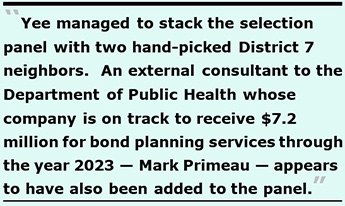 The RFQ indicated a selection panel would hold interviews with prospective bidders during the week of February 17 or the week of February 24, and an announcement of the developer team chosen would be made during the week of March 9. Yee managed to stack the selection panel with two hand picked District 7 neighbors. And an external consultant to the Department of Public Health whose company is on track to receive $7.2 million for bond planning services through the year 2023 — Mark Primeau — appears to have also been added to the selection panel, replacing an actual DPH employee.
The RFQ indicated a selection panel would hold interviews with prospective bidders during the week of February 17 or the week of February 24, and an announcement of the developer team chosen would be made during the week of March 9. Yee managed to stack the selection panel with two hand picked District 7 neighbors. And an external consultant to the Department of Public Health whose company is on track to receive $7.2 million for bond planning services through the year 2023 — Mark Primeau — appears to have also been added to the selection panel, replacing an actual DPH employee.
On March 10, MOHCD responded to a records request saying the selection process had been delayed until March 30, 2020 ostensibly because MOHCD needed additional time to organize the interview and review panel. MOHCD’s March 10 response was ridiculous on its face because a source who requested anonymity independently confirmed subsequently that the interviews with potential developers were, in fact, completed during the week of March 9, albeit two weeks later than the planned week of February 17 interview schedule initially announced.
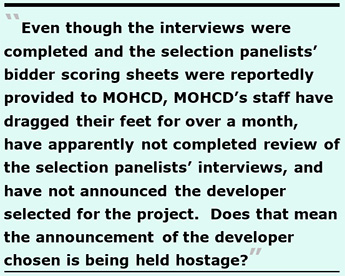 Since then, even though the interviews were completed and the selection panelists’ bidder scoring sheets were reportedly provided to MOHCD, MOHCD’s staff have dragged their feet for over a month, had apparently not completed review of the external selection panelists’ interviews, and had not announced the developer selected for the project by April 6, nearly a month after the developer team selection was to have been announced on March 9 indicated in the RFQ. Does that mean the announcement of the developer chosen is being held hostage until Breed eventually lifts her SIP Order?
Since then, even though the interviews were completed and the selection panelists’ bidder scoring sheets were reportedly provided to MOHCD, MOHCD’s staff have dragged their feet for over a month, had apparently not completed review of the external selection panelists’ interviews, and had not announced the developer selected for the project by April 6, nearly a month after the developer team selection was to have been announced on March 9 indicated in the RFQ. Does that mean the announcement of the developer chosen is being held hostage until Breed eventually lifts her SIP Order?
If MOHCD staff do not have access to either videoconferencing and teleconferencing capabilities, or have network permissions to remotely access all of their e-mail records and other computer files on departmental network drives, they should be provided with such technology immediately. After all, if Yee’s housing proposal for LHH’s campus proved not to be financially viable during or following the developer interviews, then MOHCD should move along and select another senior housing project elsewhere in the City.
We may have to prepare to go through a similar COVID-19, or a COVID-20, resurgence in the fall perhaps with more shelter-in-place orders, and perhaps further restrictions on physical (social) distancing and public meetings. We can’t allow funding and development of affordable housing to face further delays. As 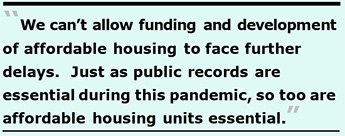 much as the public records are essential during this pandemic, so too are affordable housing units essential.
much as the public records are essential during this pandemic, so too are affordable housing units essential.
In future articles, I’ll explain why I have thought all along that placing this housing on LHH’s campus was terribly misguided from the beginning. The shut down of access to essential public records remains worrisome.
Monette-Shaw is a columnist for San Francisco’s Westside Observer newspaper, and a member of the California First Amendment Coalition (FAC) and the ACLU. He operates stopLHHdownsize.com. Contact him at monette-shaw@westsideobserver.com.